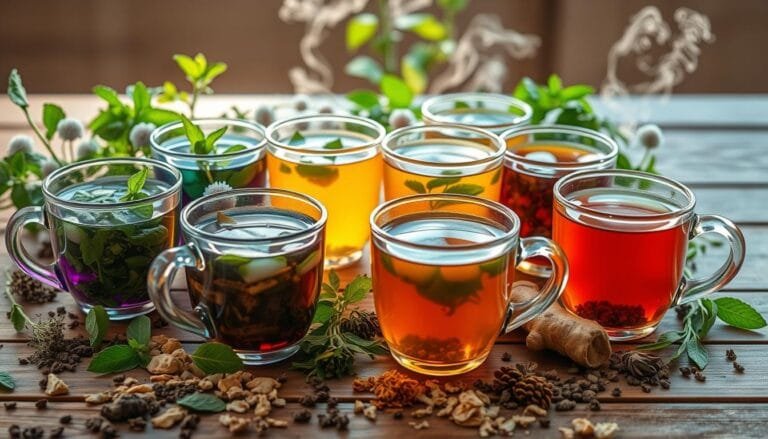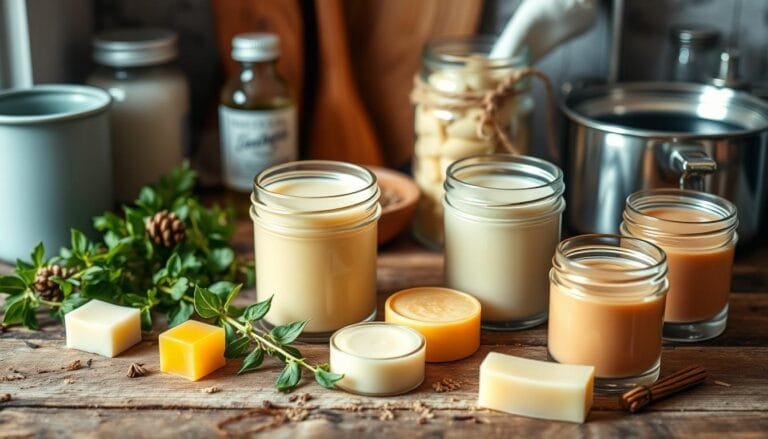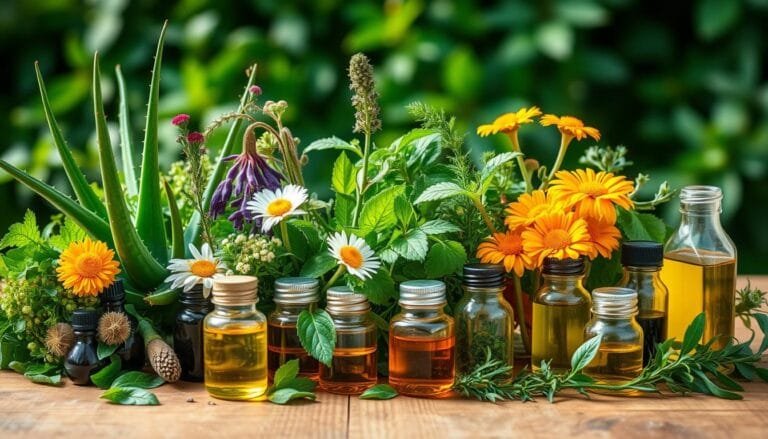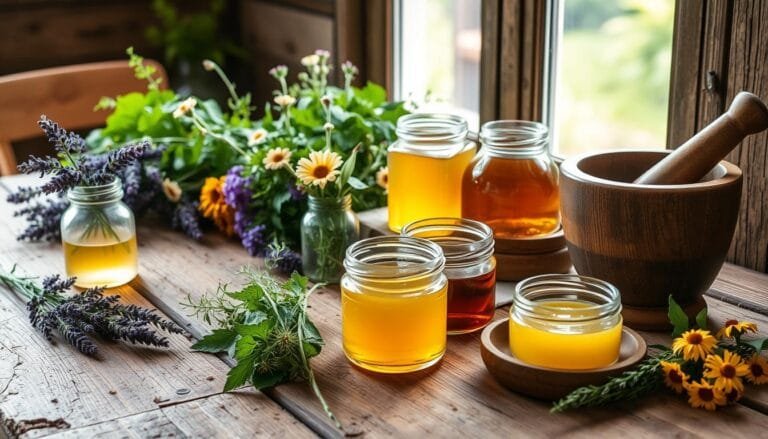I’ve learned how herbs can greatly affect hormone balance. Hormones are like messengers in our body, controlling growth, reproduction, and mood. When they get out of balance, it can cause health problems like stress and infertility.
Whether you’re going through puberty, pregnancy, or menopause, or just want to improve your health, natural herbal remedies can help. In this guide, we’ll look at the top herbs for balancing hormones and improving endocrine health.
Understanding Hormones and Their Impact on Your Health
Hormones are key chemical messengers in our bodies. They help control many functions, like metabolism and mood. The endocrine system, which makes hormones, is vital for our health. If this system gets out of balance, it can cause many health problems.
How Hormonal Imbalances Affect Your Body
Hormonal imbalances can come from diseases like diabetes or thyroid issues. They can also be caused by environmental factors. These imbalances can show up as irregular periods, hair loss, or mood swings.
Common Signs of Hormone Disruption
- Menstrual changes: Absent, frequent, heavy, or irregular periods due to fluctuating estrogen levels
- Hair issues: Hair loss or excessive growth, often linked to thyroid disorders or PCOS
- Skin problems: Acne, dark patches, and other changes related to estrogen and progesterone levels
- Sex-related symptoms: Low libido, vaginal dryness, pain during sex, and vaginal atrophy
- Weight changes: Unexplained weight gain or loss, potentially linked to thyroid disorders, PCOS, or Cushing’s syndrome
- Mood and sleep disturbances: Anxiety, depression, irritability, and sleep issues related to hormonal imbalances affecting serotonin levels
- Digestive issues: Constipation or diarrhea, sometimes associated with hormonal fluctuations and irritable bowel syndrome
Natural vs. Synthetic Hormone Solutions
Fixing hormonal imbalances can involve medicine or natural remedies. Some people choose natural options because they might have fewer side effects. Always talk to a doctor to find the best treatment for you.
“Hormones are the body’s chemical messengers, coordinating communication between different tissues and organs to maintain homeostasis.”
The Science Behind Herbs for Hormonal Balance
Herbs are packed with phytochemicals, compounds from plants that affect hormone levels. Some herbs are adaptogens, helping the body handle stress and keep hormones balanced.
Research in herbal medicine is uncovering how certain herbs affect hormone production. It’s looking at specific compounds and their impact on the endocrine system. This research gives us a better understanding of how herbs can regulate hormones.
- Adaptogenic herbs like Panax ginseng, Ashwagandha, and Rhodiola Rosea are prized for their ability to help the body manage stress and support healthy hormone levels.
- Panax ginseng, also known as Asian ginseng, is valued in traditional Chinese medicine for increasing energy, improving cognitive function, and boosting the immune system.
- Ashwagandha, scientifically known as Withania somnifera, is popular for reducing stress, improving mood, and aiding in relaxation and better sleep.
- Rhodiola Rosea, a herb grown in cold mountain areas, is used to fight fatigue, enhance mood, and improve cognitive function, specially during stress or mental fatigue.
Adaptogens have bioactive compounds like complex phenolics and ginsenosides. These compounds help with stress relief and hormone balance.
Research on herbal medicine for hormone regulation is ongoing. It shows promise for herbs like vitex and maca in supporting female reproductive health and managing menopause symptoms. As we learn more about phytochemicals and their effects on the endocrine system, the role of herbs in hormonal balance becomes clearer.

Essential Properties of Hormone-Balancing Herbs
Finding balance in our hormones can be tough. But, nature has given us adaptogenic herbs to help. These plants have special properties that work together to support our hormones and health.
Adaptogenic Properties
Herbs like ashwagandha and rhodiola rosea help our bodies deal with stress. They help keep our hormones in check and build our resilience against stress.
Phytoestrogenic Effects
Herbs like black cohosh and red clover have compounds that act like estrogen. They help with menopause symptoms and support women’s health by filling the gap left by estrogen decline.
Anti-inflammatory Benefits
Herbs like turmeric and globe artichoke have strong anti-inflammatory effects. They help reduce inflammation, which is key to fixing hormonal imbalances and keeping our endocrine system healthy.
These herbs are great because they work together to balance our hormones and improve our health.
| Herb | Adaptogenic Properties | Phytoestrogenic Effects | Anti-inflammatory Benefits |
|---|---|---|---|
| Ashwagandha | ✓ | – | ✓ |
| Rhodiola Rosea | ✓ | – | ✓ |
| Black Cohosh | – | ✓ | ✓ |
| Red Clover | – | ✓ | ✓ |
| Turmeric | – | – | ✓ |
| Globe Artichoke | – | – | ✓ |
“The true medicine is within you, in your own body and in your environment. The art of healing comes from nature, not from the physician.” – Paracelsus
Ashwagandha: The Stress-Reducing Powerhouse
Ashwagandha is known for its stress management abilities. It’s an adaptogenic herb that supports overall wellbeing. Studies have shown its effectiveness in helping the body handle stress.
Ashwagandha works by balancing the brain’s stress response system. It can lower cortisol levels, the main stress hormone. This can lead to better sleep and emotional balance.
| Benefit | Findings |
|---|---|
| Stress and Anxiety Reduction | A 2021 systematic review found that ashwagandha significantly reduced stress and anxiety. This was seen in seven studies with 491 adults in India. |
| Improved Sleep Quality | Research shows ashwagandha extracts can improve sleep. Participants saw better sleep efficiency and quality of life. |
| Enhanced Cognitive Function | A study at the University of Colorado found ashwagandha improved well-being and mental clarity. Participants also reported better energy and sleep. |
Ashwagandha may also help with insulin and thyroid hormone levels. It’s a versatile herb with many health benefits. But, more research is needed to fully understand its effects.

Before adding ashwagandha to your routine, talk to a healthcare professional. Understanding its science can help you use it wisely for your health.
Black Cohosh and Chasteberry for Women’s Health
Women’s hormonal health can be tough to navigate. But black cohosh and chasteberry offer natural solutions. These plants have a long history in traditional medicine. Research shows they might help with menopause and fertility issues.
Menopause Support Benefits
Black cohosh is a plant from North America. It’s known for easing menopause symptoms. It might act like estrogen, helping with hot flashes and night sweats.
While not all studies agree, some show it helps. People taking black cohosh had fewer and milder hot flashes.
PMS Symptom Relief
Chasteberry, or vitex, has been used for centuries. It helps with premenstrual syndrome (PMS). It might lower prolactin, a hormone linked to PMS symptoms.
Studies show chasteberry can improve PMS symptoms. It helps with irritability, bloating, and breast tenderness.
Fertility Enhancement Properties
Black cohosh and chasteberry also support fertility. Chasteberry might help regulate menstrual cycles. This can improve chances of getting pregnant, even for women with reproductive issues.
More research is needed, but these herbs are promising. They offer a natural way to address fertility concerns.
Always talk to a healthcare professional before using black cohosh or chasteberry. They can guide you on dosage and safety. With the right advice, these herbs can help improve women’s hormonal health.
“Herbs like black cohosh and chasteberry have a long history of use in traditional medicine, and growing research suggests they may offer natural solutions for a range of women’s health concerns.”
Sage and Marjoram: Traditional Hormone Helpers
Two remarkable herbs, sage and marjoram, are known for their hormone-balancing abilities. They offer a natural way to manage hormonal changes. This approach is gentle and effective.
Sage is great for hot flashes and night sweats during menopause. It also helps the nervous system, easing exhaustion. Marjoram supports hormonal balance and may ease menstrual pain.
You can enjoy these herbs in many ways, like teas or supplements. Adding sage and marjoram to your routine can help balance hormones. This can ease menopausal symptoms gently.
“Marjoram has demonstrated antimicrobial properties, used for treating fungal infections and gut bacteria overgrowth.”
Marjoram also has antioxidant, antibacterial, and anti-inflammatory effects. These benefits make it a great addition to herbal remedies.
If you’re dealing with hot flashes, mood swings, or other hormonal issues, try sage and marjoram. They are natural solutions with a long history of helping people. Discover how these herbs can improve your wellbeing.
Red Clover and Paeony: Balancing Female Hormones
Women need to keep their hormones in balance for good health. Two herbs, red clover and paeony, are great for this. They help with female hormone balance and the menstrual cycle.
Isoflavone Content Benefits
Red clover is full of isoflavones. These plant compounds act like estrogen in our bodies. They help with hot flashes, mood swings, and PMS.
By acting like estrogen, red clover keeps hormones in check. This helps reduce the effects of hormonal changes.
Menstrual Cycle Regulation
Paeony has been used for centuries in traditional Chinese medicine. It helps regulate hormones and the menstrual cycle. It also eases PMS and menstrual problems.
Adding red clover and paeony to your routine helps with female hormone balance. They support a healthier menstrual cycle. These herbs are a natural way to handle common women’s health issues.
“Red clover and paeony have been used for centuries to support women’s health, and modern research has confirmed their non-hormonal benefits in regulating hormones and easing menstrual discomforts.”

Proper Dosage and Safety Guidelines
Using herbal supplements for hormonal balance is important. You need to know the right dosage and safety tips. Herbal remedies are usually safe but can interact with drugs or cause side effects if not used right.
The best herbal supplement dosage depends on the herb, supplement form, and your health. Start with the lowest recommended dose and increase if needed. Watch for any side effects.
Here are some general dosage tips for herbs that help balance hormones:
- Ashwagandha: 300-500 mg of extract, twice daily
- Maca root: 1,500-3,000 mg of powder, daily
- Chasteberry: 20-40 mg of dried extract, daily
- Black cohosh: 20-40 mg of standardized extract, twice daily
Always talk to a healthcare professional before using these supplements. This is true if you’re taking drugs or have health issues. Pregnant or breastfeeding women and people with chronic health problems should be extra careful.

Knowing the right dosage and safety tips lets you use nature’s remedies safely. This can help balance your hormones and improve your health.
Lifestyle Factors That Support Herbal Remedies
Looking to boost herbal remedies for hormonal balance? Your lifestyle plays a big role. Focus on diet, exercise, stress, and sleep. These areas can make herbal solutions work better.
Eating a balanced diet is key. Include lean proteins, complex carbs, and omega-3s like fish, nuts, and seeds. This helps keep hormones in check.
Don’t forget exercise. It’s vital for hormone balance. Try strength training, cardio, and yoga. These activities boost herbal remedy effects.
Stress can mess with hormones. Use meditation, deep breathing, and mindfulness to keep cortisol low. This helps your body use herbal supplements better.
Quality sleep is also important. Aim for 7-9 hours each night. And stay away from blue light before bed to keep your body’s clock in sync.
By adding these lifestyle tips to your day, you’ll get more from herbal remedies. A balanced approach to diet and lifestyle is key to unlocking natural solutions’ full power.
“Harmonizing your lifestyle choices with the use of herbal remedies can be a powerful combination for achieving hormonal balance and overall well-being.”
Integrating Herbs into Your Daily Wellness Routine
Adding hormone-balancing herbs to my daily life is easy and effective. I can enjoy herbal teas, take supplements regularly, or follow a holistic health plan. These methods help me incorporate natural remedies into my routine smoothly.
Herbal teas are a tasty and easy way to get these benefits. I can try teas with ashwagandha, tulsi, or dong quai. Drinking these teas all day gives me a steady flow of nutrients to balance my hormones. I also consider taking supplements like black cohosh or rhodiola rosea to meet my hormonal needs.
For the best results, I mix herbal remedies with a healthy diet, exercise, and stress management. It’s key to watch how I’m doing and adjust with help from experts like those at CentreSpringMD. By making herbs a part of my daily routine, I’m taking a big step towards hormonal balance and better health.







